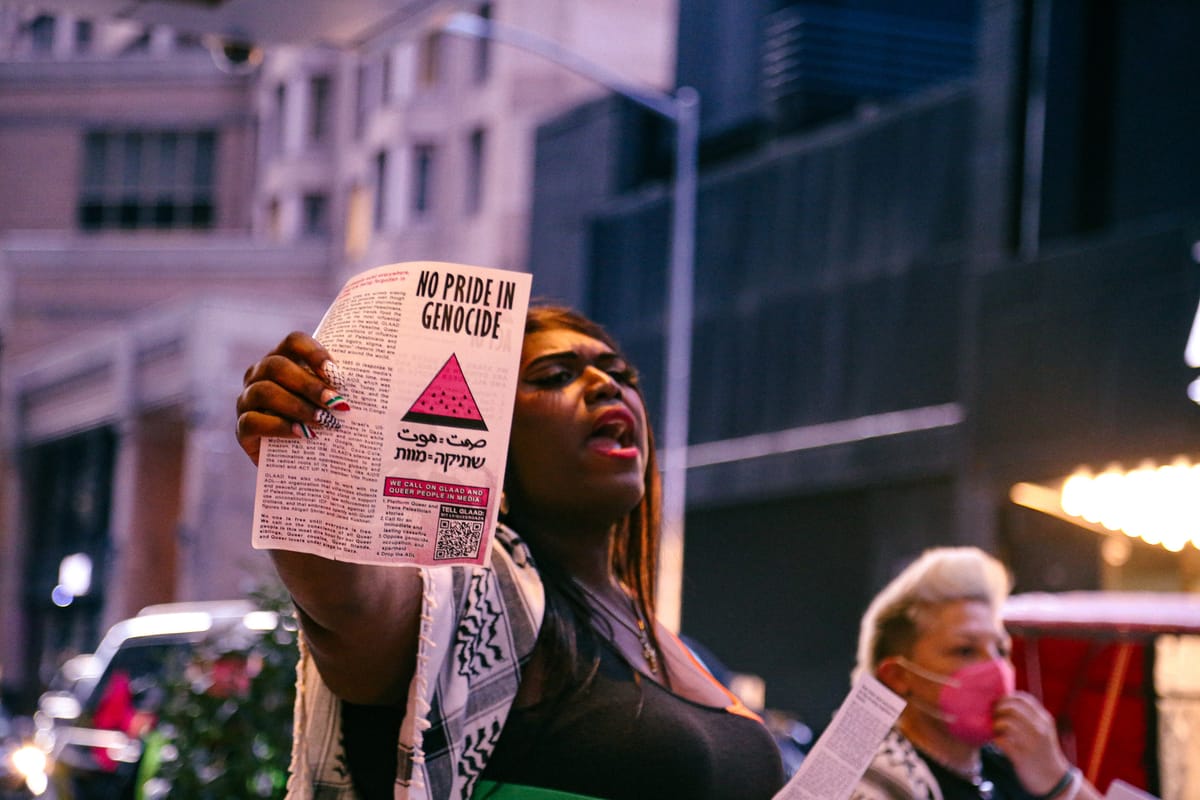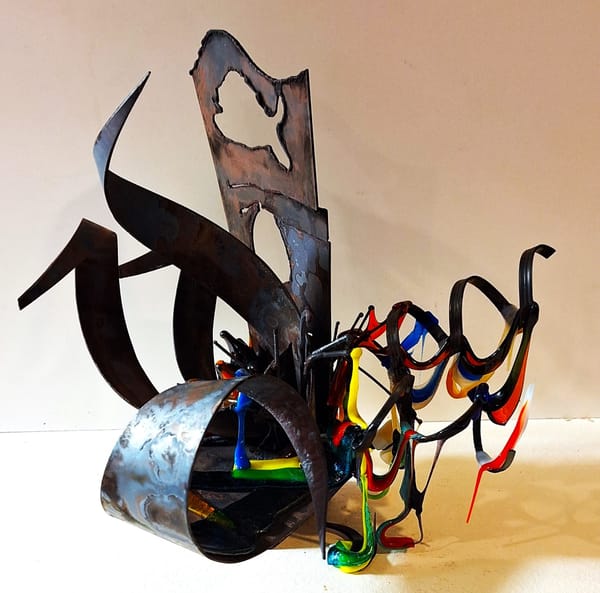Required Reading
This week, remembering writer Alice Munro, double standards for student protesters, the cinematic history of cigarettes, BBC’s iconic jingle, and more.

‣ This week marked 39 years since the Philadelphia police bombed the MOVE Black liberation group, killing 11 people and destroying dozens of homes. For WHYY, Cory Sharber reports on a memorial held in honor of the victims and their families’ ongoing fight for their remains, reportedly held by major museums:
Africa Jr. said while the bomb itself received a lot of attention, the real issue is “murder.”
“It wouldn’t be what it is without the murders. Eleven people were murdered and then their bodies were stolen by Penn and used as research material and teaching material at Princeton,” Africa said. “It could happen again.”
In 2021, it was reported the University of Pennsylvania possessed the remains of child victims Katricia and Zanetta Dotson without the knowledge of their relatives.
Their brother sued the city and the university in 2022 for “torturous interference” of a dead body and emotional distress, among other charges.
‣ Jia Tolentino has a must-read essay detailing her attempts to hide her pregnancy from her phone and the longer historical relationship between parenthood and privacy for the New Yorker:
For many women in America, pregnancy was a conduit to state surveillance long before the end of Roe. Poor women, especially poor nonwhite women, are often drug-tested during pregnancy, and sometimes during labor and delivery, without their informed consent. Women who take drugs during pregnancy have been charged with child abuse or neglect, including in cases in which the drugs were legal; women who have miscarried after taking drugs have been charged with manslaughter, even homicide, even when no causal link was proved. Sometimes this happens because the woman in question had responded to billboards and service announcements promising to help pregnant people who are struggling with substance use. In multiple states, women have been taken into custody when the safety of the fetus was called into question. “To be pregnant and poor in the United States is to play a game of roulette with one’s privacy, presumed confidential relationship with medical providers, and basic constitutional and medical rights,” the law professor Michele Goodwin writes in “Policing the Womb,” from 2020.
‣ Miriam Gordis writes about the behind-the-scenes labor that powers book publishing through the lens of a new book that attempts to elucidate how conglomeration altered the industry (which, as she explains, completely fumbles the bag). She opines for the Verso Blog:
Above all, Big Fiction feels like a missed opportunity to write a labor history of publishing. Some of the biggest losers of the conglomerate era are young editors, who face increasingly unrealistic pressure to sell books while being stonewalled by higher-ups. The road to promotion is arduous, and yearly salary increases at most of the big corporate houses remain minute, leading to what has been termed an “editorial drain” within the industry. In France, where conglomeration has advanced rapidly in recent years following the acquisition of the Lagardère Group (the parent company of Hachette) by media mega-corporation Vivendi, there has been a sudden surge of editors or rights directors becoming literary agents, previously a marginal aspect of the French industry. It is quite simply easier to make money as an agent if you are successful; agents are at least guaranteed a cut of the profits.
‣ The beloved and singularly gifted writer Alice Munro passed away this week at age 92, and novelist Sheila Heti pens a remembrance in the New York Times about the luminary author’s refusal to mold herself into what others thought a writer should be:
Fiction writers are people, supposedly, who have things to say; they must, because they are so good with words. So people are always asking them: Can you say something about this or about this? But the art of hearing the voice of a fictional person or sensing a fictional world or working for years on some unfathomable creation is, in fact, the opposite of saying something with the opinionated and knowledgeable part of one’s mind. It is rather the humble craft of putting your opinions and ego aside and letting something be said through you.
Ms. Munro held to this division and never let the vanity that can come with being good with words persuade her to put her words just everywhere, in every possible way. Here was the best example in the world — in Canada, my own land — of someone who seemed to abide by classical artistic values in her choices as a person and in her choices on the page. I felt quietly reassured knowing that a hundred kilometers down the road was Alice Munro.
‣ For Teen Vogue’s series on the student debt crisis, Jacqui Germain shines a light on the long-term consequences of paying off loans that weigh on millions of Americans for years, if not decades:
Everyone in his generation got the same message, says Moran: Get into the best college you can, take out loans to cover the cost, and you’ll land a job that earns enough to pay them back and build a middle-class life. But when Moran took out his private student loans almost a decade ago, he never would have guessed they could derail his life this much.
“As a 17-year-old, I had no idea about federal versus private loans and the government protections that come with federal loans and not private loans,” Moran tells Teen Vogue. “It's a predatory industry in the first place to make a 17-year-old make a long-term bet on themselves as to where they'll be financially 10, 20 years down the road.”
‣ In the Cut, Talia Lavin writes about Orthodox Jewish women’s sex strike in protest of the gett, men’s right to refuse a divorce. Through interviews and careful reporting, Lavin, who grew up Orthodox, delves into the individual stories and social and cultural factors that underlie the news item:
Yet due to the unique qualities of Orthodox Jewish marriage, a man has the absolute right to refuse a divorce decree, known as a gett, no matter the circumstances, and thus prevent his wife’s remarriage. Gett refusal has haunted the dissolution of Jewish marriages for millennia, and there is a term for a woman trapped in legal limbo: agunah — a woman in chains. Should she remarry without obtaining her gett, any future children would technically be considered products of adultery; they would be mamzers, a category worse than bastardy. Mamzers are forbidden from marrying other Jews, and the taint is passed to their children. (The same taint does not apply to the children of men who remarry without obtaining a religious divorce.)
Growing up Orthodox, I was taught to treat gett refusers (mesorevei gett) with revulsion: They are lower than low, monstrous creatures who use sacred laws for their own ends, which can involve financial gain, more favorable custody or child-support arrangements, or straightforward abuse and control. Fans of The Sopranos might recall that show’s depiction of such coercion: The mafia is brought in to work over a Hasidic man holding his wife’s gett hostage for a 50 percent stake in his father-in-law’s Catskills motel. Tony Soprano’s approach was actually tame compared to a real-life debacle involving Mendel Epstein, a rabbi from the heavily Orthodox town of Lakewood, New Jersey, who became known as “The Prodfather” in the tabloid press after he was convicted of conspiracy to kidnap gett refusers and torture them with cattle prods and stun guns until they agreed to grant the divorce, charging hefty sums to the wives and their families for the service.”
During her seven years in “Siberia,” Malky has sought out multiple solutions, from begging her husband for a gett (he subsequently blocked her from his phone, she told me) to begging his family for help.
‣ For his website Everything is Horrible, Noah Berlatsky explains how a 1903 poem commemorating a Russian pogrom spawned the term “with trembling knees,” a frequently employed phrase in Zionist rhetoric. He delves into the poem verse by verse, illuminating how the prose itself is simultaneously anti-Semitic and primed for Zionist appropriation:
And in a Jerusalem Post editorial, Zvika Klein evoked the 1982 words of Israeli Prime Minister Menachim Begin in a meeting with then head of the Senate Foreign Relation Committee Joe Biden: “I am not a Jew with trembling knees.”
You can find lots of other examples on social media; Zionists, individually and as a group, want to let you know that they are not those Jews. Which raises the question, who are the Jews whose lower extremities wobble? If the good, strong Jews are over here, who are the weak, worthless Jews over there?
The answers aren’t exactly counterintuitive or surprising. Still, it’s useful to look at the history of the phrase to understand the ways in which praise of Zionist strength and militarism are inseparable from contempt for Jewish diaspora victimization. Those who suffer are framed as contemptible—which makes the brutalization of your enemy a moral imperative, and even a joy.
‣ In Jewish Currents, Jeff Schuhrke explores how pro-business groups are using antisemitism claims to attack unions, paying special attention to an ongoing lawsuit against the Association of Legal Aid Attorneys (ALAA) over the organization’s pro-Palestine resolution:
Private sector workplaces in more union-friendly states like New York have thus far remained outside the purview of this particular anti-union strategy, but the recent lawsuit against the ALAA aims to change this. Filed by the Liberty Justice Center, one of the right-wing law firms behind the Januscase, the suit is an attempt to use the union’s pro-Palestine position as a justification to extend Janus to private organizations that receive government funding. The suit argues that since the plaintiffs’ employer is contracted by New York City to provide legal counsel to indigent defendants, Janus should apply to its staff. This is not the first effort by anti-union groups to broaden the scope of Janus. In recent years, other such lawsuits—such as one demanding that public sector unions reimburse the agency fees non-members paid prior to Janus, and another seeking to prevent unions from limiting when free riders can opt out—have been rejected by the Supreme Court, but not before forcing unions to expend significant resources on unnecessary litigation. There is a chance that the new Liberty Justice Center lawsuit will go the same way, being dismissed in court while nevertheless costing the ALAA time and money. However, if the case makes it to the Supreme Court, it is conceivable that the conservative majority could rule that Janus is applicable in cases where a private sector worker’s job duties are entirely government-funded. With an estimated 80% of all nonprofit revenues in the US coming from government sources, such a decision could have major ramifications for the tens of thousands of workers who have been rapidly unionizing in recent years at nonprofit cultural institutions, advocacy groups, and social service organizations.
‣ The new star-studded TV show Palm Royale is set in Florida in 1969, but nobody’s smoking, even though just a little less than half of the American population was smoking in that decade. Matt Zoller Seitz breaks down onscreen cigarettes for Vulture:
And by smoking I don’t mean they should take one or two puffs, then stub it out. They should be exhaling roiling cumulus clouds of smoke during casual conversations, lighting up while watching Walter Cronkite and Johnny Carson, extinguishing cigarettes in bedside ashtrays before they go to sleep. If you catch a glimpse of their dreams, there should be smoking in them. Any period piece set between 1800 and 2000 that doesn’t at least occasionally show people smoking cigarettes, pipes, opium, marijuana, hash, or anything else you can light and inhale is a period piece that’s fundamentally compromised. The farther back in the timeline you go, the more the visuals of the piece should be choked with smoke; whether it’s in the foreground or background doesn’t matter.
Mad Men got this right. Righter than any period drama made for TV during the preceding two decades. Just in case you thought all the smoking was an endorsement, the show began with Madison Avenue advertising-wizard Don Draper, a prodigious smoker, pitching a cigarette ad campaign, and ended with a character who’d smoked through all seven seasons dying from lung cancer. The characters on Mad Men also drank casually — at home, at work, in bars — to a far greater extent than people do now. This is a separate but related discussion. Suffice to say that if you were alive for any part of history prior to the turn of the millennium, you know that people participated in self-destructive but visually interesting activities. To quote David Milch, whose work for Deadwood, NYPD Blue, and Hill Street Blues did not lack for depictions of smoking, drinking, and every other sort of vice, “There are times in life when intoxicants are not only permissible but necessary.”
‣ Columbia and CUNY students have been handed very different consequences for their involvement in pro-Palestine protests. Students at the “overwhelmingly working class, overwhelmingly first generation” City College face criminal complaints including burglary in the third degree, which can carry up to seven years in prison, while their Ivy League neighbors look at significantly less severe charges. Nicholas Niarchos has the story for the Nation:
Wong said that the disparities in charges raise questions. “I think it’s a question for many folks who are hearing about these charges—why is it that the public school kids got the more serious charges, as opposed to the private school kids?” she said, although she could not speak to prosecutorial decisions in this specific case. “In my experience, as a public defender, seeing a disparity in charges that reflects the socioeconomic class divide—that’s not uncommon.” The DA’s office has said it will continue to investigate, and that the charges might change.
The police violence at City College was more intense than at Columbia (although one police office did discharge a firearm during the operation to retake Hamilton Hall). There are reports of numerous students and faculty members being tasered and pepper-sprayed by police officers on the Harlem campus. Two students had their teeth smashed and one undergraduate’s ankle was broken. (The NYPD’s press office declined to comment, but referred me to a press conference given by Mayor Eric L. Adams and Police Commissioner Edward A. Caban the morning after the arrests in which Adams blamed a global “movement to radicalize young people” for the violence.) The City College administration was unavailable to comment at time of publication.
‣ These are terrifying times in film and television:
https://www.tiktok.com/@producerpatrick/video/7367246093505056042?_r=1&_t=8mEw4de0JTv
‣ In less than two generations, a bird species in Florida evolved to eat bigger snails:
‣ Chappaquiddick Wampanoag TikToker @kararoselles takes Lizzo to task on her claim that celebrities don’t have as much power as we think (hint: they do):
https://www.tiktok.com/@kararoselles/video/7367427513892621610?_r=1&_t=8mHu4REzQLO
‣ David Lowe breaks down how he created the BBC theme song 25 years ago:
https://www.tiktok.com/@davidlowemusic/video/7367265980193475872?_r=1&_t=8mP4KbbkrP8
‣ The thought running through celebrities' heads after influencer @haleyybaylee cracked their carefully crafted PR facade last week at the Met Gala:
https://www.tiktok.com/@drewparker2k/video/7367504643011693867?_r=1&_t=8mP4lVdYmLL
Required Reading is published every Thursday afternoon, and it is comprised of a short list of art-related links to long-form articles, videos, blog posts, or photo essays worth a second look.





